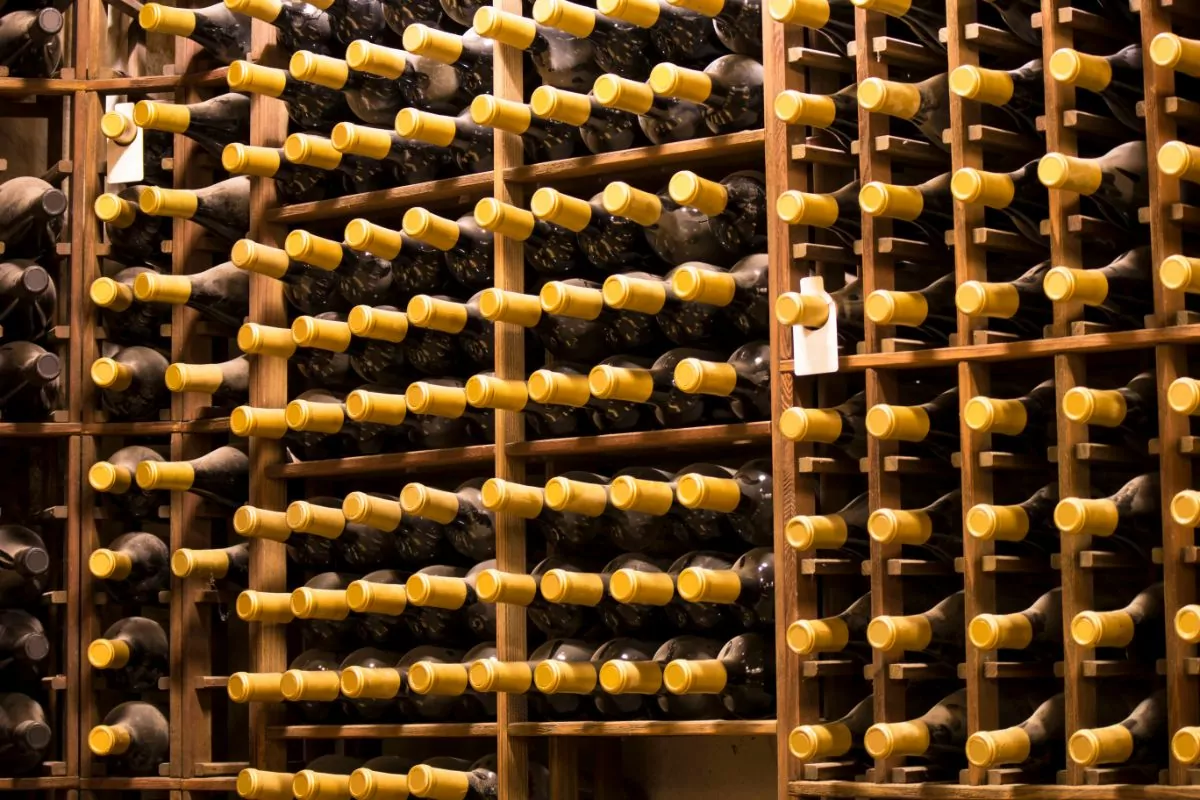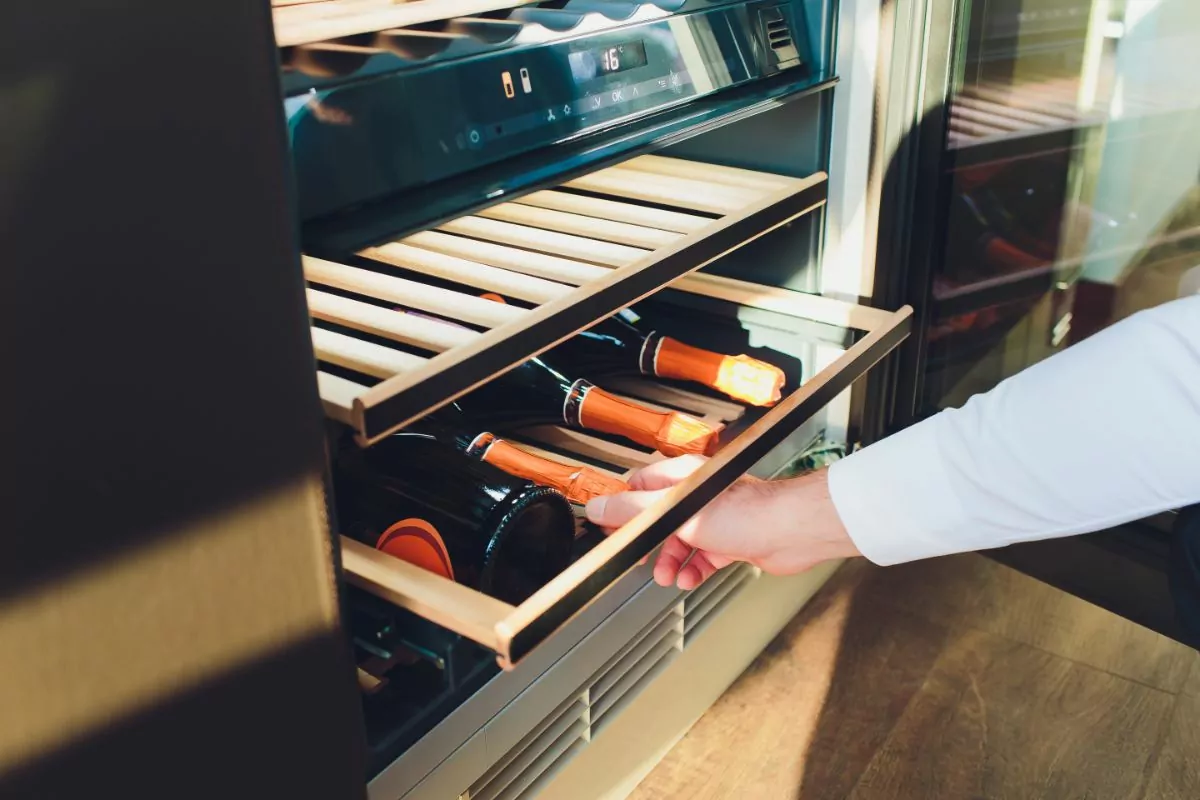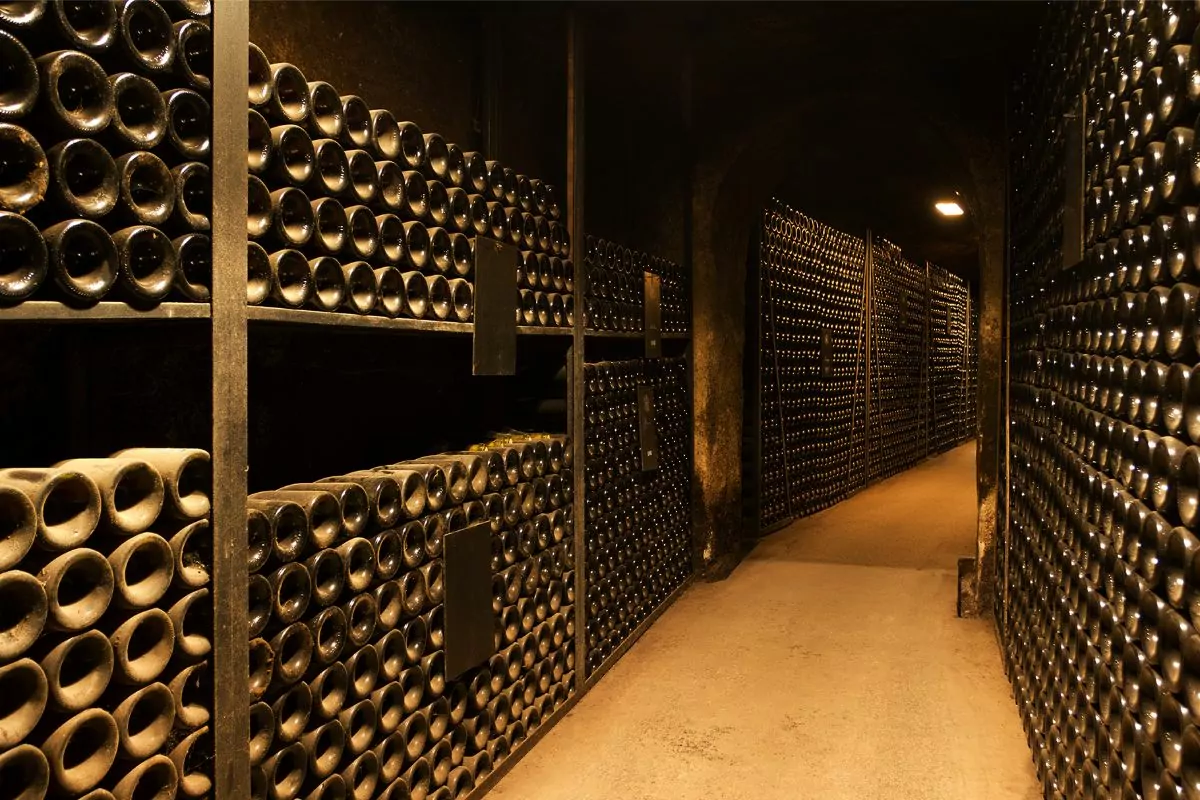If you’re serious about collecting and enjoying wine, you will need to think about your storage options.
When it comes to wine, your main options in terms of storage (assuming you want to keep your wine cool and not at room temperature) are either a wine fridge or a wine cellar.

There are advantages and disadvantages to both of these options, and their relative suitability is largely dependent on factors such as your living situation and the size of your wine collection.
If you’re struggling to choose between a wine fridge or a wine cellar, this guide is for you! We’ll cover the pros and cons of a wine fridge vs a wine cellar and help you figure out which one you should choose.
What Is A Wine Fridge?
You might also hear a wine fridge referred to as a wine cooler. This appliance is a refrigerator specifically designed for the purpose of storing wine.
The difference between a wine fridge and a regular fridge is that wine fridges are set at a constant temperature of 55 degrees Fahrenheit.
This is very different from the temperature in a regular refrigerator, which is much lower, at around 40 degrees Fahrenheit.
A wine fridge will ensure that your wine doesn’t get too warm, which could cause it to age faster than it should. At the same time, it makes sure the wine doesn’t get so cold that it freezes, which permanently changes the flavor.
Although some wines need to be stored at a warmer or cooler temperature than 55 degrees, this is the ideal temperature for most wines.
What Is A Wine Cellar?
A wine cellar is basically exactly what it sounds like: a cellar-like room dedicated to storing wine.
A wine cellar may be an actual cellar, located in the basement, but you can also build a wine cellar more or less anywhere in your home, provided that it’s a sealed space with good ventilation.
Wine cellars are usually kept at the same temperature as a wine fridge: 55 degrees Fahrenheit. These rooms are ideal for wines that need to be aged for a long time, and they can also be used to store wines in the medium and short-term.
Pros And Cons Of Wine Fridges

Pros
- Versatile: Since wine fridges are much smaller than wine cellars, they can go anywhere in your home. They also come in a wide range of different sizes, which means you can get a wine fridge that’s compatible with your spatial needs.
- Affordable: Compared to building a whole wine cellar in your home, a wine fridge is much more affordable. Therefore, if you need somewhere to store your wine at an optimal temperature but don’t have a lot of disposable income, a wine fridge might be your best option.
- Ideal for small collections: If you only have a relatively small collection of wine, it might not make sense to have an entire wine cellar in your home. In this case, a wine fridge is the more sensible option.
- Option for dual zone cooling: Not all wine fridges come with dual-zone cooling, but it’s a great feature that comes with some of the more high-end models. Dual-zone cooling means that you can set different areas of the fridge to different temperatures, which is ideal if you have a varied collection of wines.
Cons
- Limited space: If you have a larger collection of wines, a wine fridge may not be the ideal storage solution. While you can get some large wine fridges, a wine cellar will always be the better choice for an extensive collection.
- Prone to temperature fluctuations: The purpose of a wine fridge is to keep your wine at a consistent temperature, and for the most part, it does exactly that. However, you will inevitably need to open the fridge door to get the wine out or add new bottles, and this causes temperature fluctuations. These changes in temperature can affect the flavor and quality of your wine. Sunlight can also get in when you open the fridge door (or if your fridge has a glass door), and this is not ideal if you need to age your wine.
- No humidity control: Although wine fridges control temperature, they don’t control humidity, which is an important factor in wine storage (Also check out Mold Cork: How Dangerous Is It?). The humidity in a wine fridge is less than 50%, whereas the ideal humidity for wine sits between 50% and 70%. For long-term storage, the humidity in a wine fridge is not optimal.
- Might break down: While none of us want to assume that our appliances will break down when we buy them, this is always a possibility. If you’re trying to decide whether to get a wine fridge or a wine cellar, you should bear in mind that while a wine cellar is pretty permanent, a wine fridge will eventually need repairing or replacing.
Benefits And Drawbacks Of Wine Cellars

Pros
- Plenty of space: If you have an extensive collection of wine, a wine cellar will be able to meet your needs better than a wine fridge. Although wine fridges come in large sizes, having an entire room dedicated to your wine collection is much more convenient.
- Controls humidity: You can’t control the humidity in a wine fridge, which will always be lower than 50%, but you can adjust the humidity in a wine cellar. This will prevent the corks from drying out and allows for long-term storage without negative effects on the quality of your wine.
- Versatile in terms of cooling: In a wine cellar, you can install various cooling systems for different types of wine, which means you never have to compromise the quality of one wine for another. While you can get dual-zone cooling in some wine fridges, this is still limited, so a wine cellar is the better choice for varying temperatures.
Cons
- Costly to build: Unfortunately, a wine cellar can be very expensive to build, and not everyone can afford to do so. If you have a lot of money put aside, this project might be manageable for you, but for most people, a wine fridge will be the better option in terms of budgeting.
- May require permission: If you own your own home, you can build a wine cellar without having to ask anyone for permission. However, if you are renting, it is quite unlikely that a landlord will allow you to make big, permanent changes to the property, and that includes building a wine cellar.
Final Thoughts
Choosing between a wine fridge or a wine cellar involves considering your budget, the size of your wine collection, and the types of wines you want to store.
A wine fridge will be the most affordable option, but it’s not suitable for larger collections and doesn’t control for humidity.
If you have a varied collection requiring different temperatures, you’ll need to get a more expensive wine fridge with dual-zone cooling, and even then, your options will be limited.
On the other hand, a wine cellar is more expensive and unfeasible to build for many people.
However, controlling humidity and installing different cooling systems in a wine cellar is easier, and it’s the better choice if you have a larger wine collection.
- Why Does Wine Taste Better With Age? - June 14, 2023
- What Does It Mean When A Bottle Of Wine Is Corked? - June 14, 2023
- Wine Fridge Vs Wine Cellar – Which One Should You Choose? - June 14, 2023
